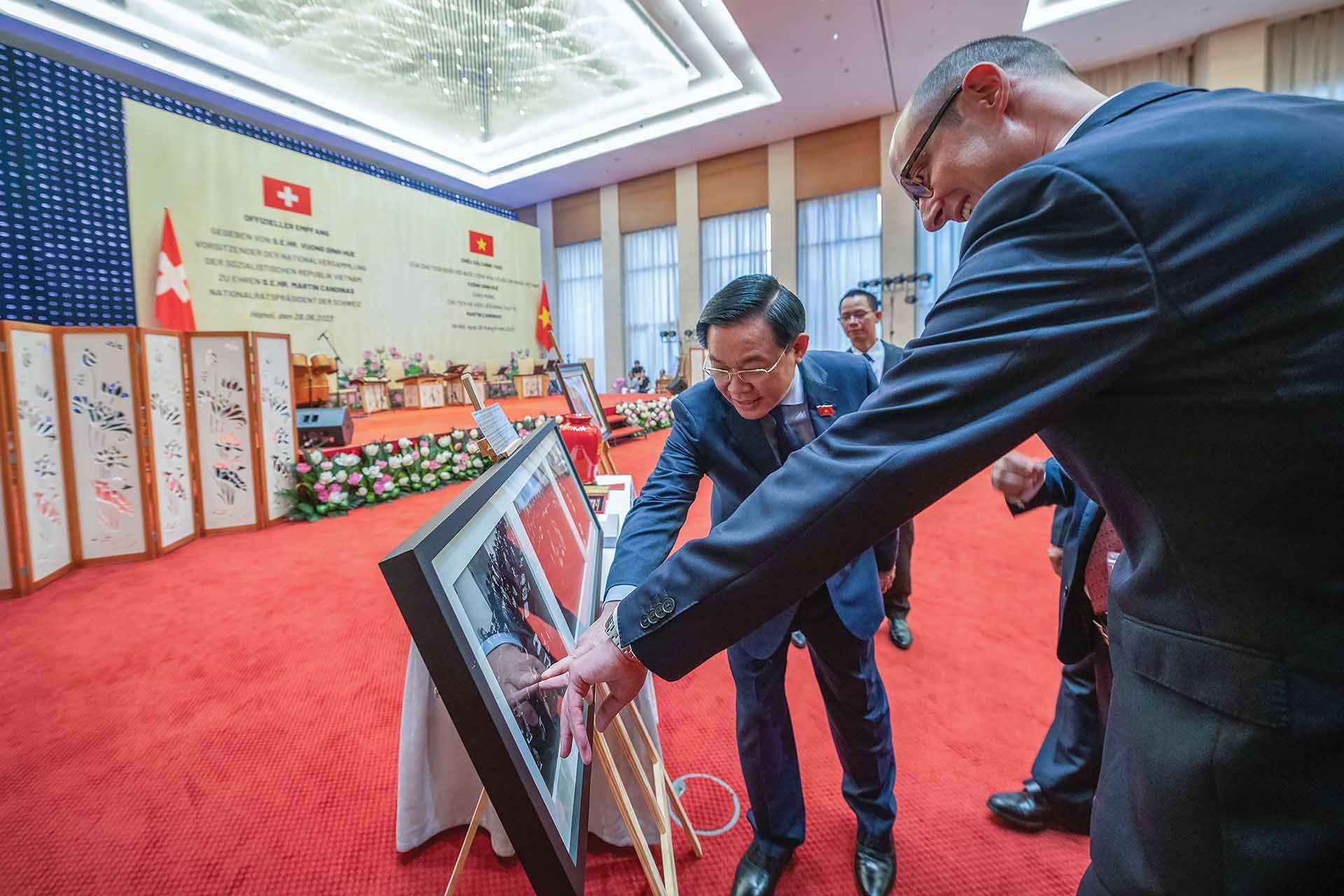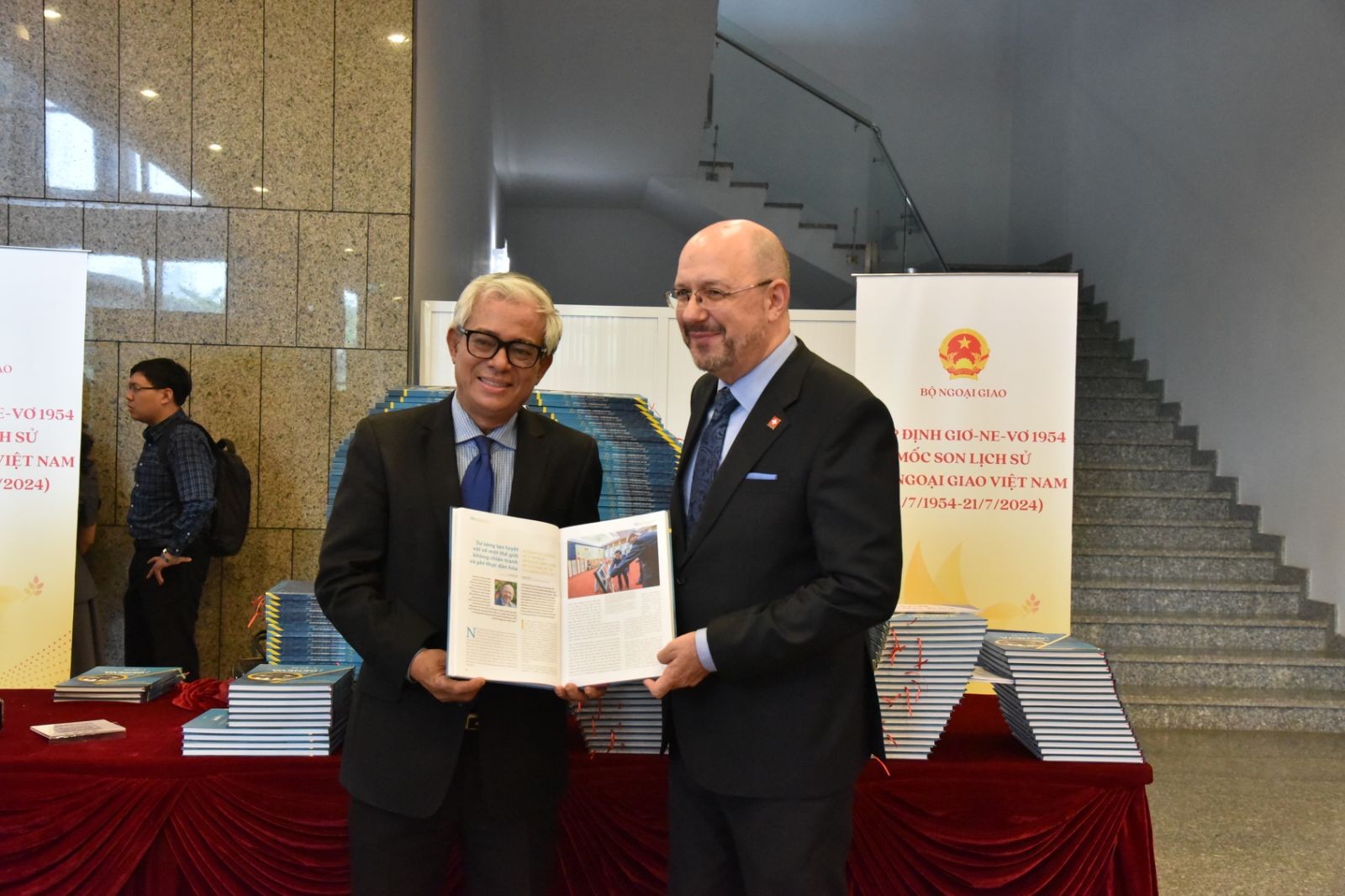
Geneva Accords - A creative utopia of a world without war and milestone of de-colonialization
Latest
In 1859, Henri Dunant, a businessman from Geneva, Switzerland witnessed the Battle of Solferino during Italy’s second war of independence. The horrific suffering he observed inspired him to take the initial steps leading to the First Geneva Convention. To this day, the Geneva Conventions and their Additional Protocols remain the foundation of international humanitarian law, governing the treatment of civilians and combatants in times of war and occupation. As the depositary of the Geneva Conventions, Switzerland will take initiatives aimed at upholding the role of international humanitarian law and fostering spaces for dialogue and the resolution of conflicts.
 |
| During his official visit to Vietnam in June 2023, Chairman of the Swiss Federal Parliament Martin Candinas presented Chairman of the National Assembly Vuong Dinh Hue with three photos of the Geneva Conference, in which the Democratic Republic of Vietnam Delegation is led by Acting Foreign Minister Pham Van Dong. |
This year, in 2024, we will be reminded of two important anniversaries. Of particular significance amidst a resurgence of brutal military interventions and countless civilian casualties, is the 75th anniversary of the 1949 Geneva Convention negotiated in the aftermath of the Second World War. The Geneva Conventions and their Additional Protocols are international treaties that contain the most important rules limiting the barbarity of war. They protect people who do not take part in the fighting, such as civilians and humanitarian workers, and those who can no longer fight because they are wounded, sick or prisoners of war.
The other event we will remember this year, is the 70th anniversary of the historic “1954 Conference on Indochina”, or Geneva Conference. The Conference took place in the Palais des Nations, the European headquarters of the UN, from 26 April to 20 July 1954 and was intended to settle outstanding issues resulting from the Korean War and the First Indochina War.
While the part of the conference that dealt with the Korean question ended without any declarations or proposals, the Geneva Accords that dealt with the dismantling of French Indochina had long-lasting repercussions. They led to the international recognition of the states of the Democratic Republic of Việt Nam (North Việt Nam), the Kingdom of Cambodia, and the Kingdom of Laos. Three agreements about French Indochina, covering Cambodia, Laos, and Việt Nam, were signed on 21 July 1954 and took effect two days later.
 |
| Three photos of the Geneva Conference that Chairman of the Swiss Federal Parliament Martin Candinas presented to Chairman of the National Assembly Vuong Dinh Hue. |
For the part of the conference that dealt with Indochina, France, the Việt Minh (Democratic Republic of Việt Nam), the Soviet Union, the People’s Republic of China, the United States, the United Kingdom, and the future states being made from French Indochina (State of Việt Nam, Cambodia and Laos) were seated at the negotiation table. The Accords temporarily separated Việt Nam into two zones: A northern zone to be governed by the Việt Minh, and a southern zone to be governed by the State of Việt Nam under former Nguyễn dynasty emperor Bảo Đại.
A Final Declaration, issued by Robert Anthony Eden, the British Foreign Secretary and Chairman of the conference, foresaw a general election to be held by July 1956 to create a unified Vietnamese state. Despite having participated in the negotiations, the delegates of the State of Việt Nam and the United States did not sign the agreements. Under Ngô Đình Diệm, subsequently withdrew from the proposed elections. The worsening relations between the North and the South would eventually lead to the terrible Việt Nam War.
The Geneva Accords were neither perfect nor fully implemented, but they were an important milestone on the road to de-colonialization and a building block of today’s Việt Nam. While the delegates began to assemble in Geneva in late April, the discussions on Indochina did not begin until 8 May 1954 - one day after the decisive victory of the Việt Minh over the French Union forces at Điện Biên Phủ, a victory that gave the Delegation of the Democratic Republic of Vietnam (DRV) gravitas and recognition amidst a conference predominantly suspicious and opposed to communism.
 |
| Swiss Ambassador Thomas Gass (right) and Ambassador Pham Quang Vinh attended the 70th Anniversary of the Geneva Agreement, held in Hanoi on April 25, 2024. |
Since May 1954, Switzerland has hosted many important dialogues and peace talks, particularly in the city of Geneva. Sometimes they are decisive steps towards rapprochement and peace, at other times they seem to yield little immediate return. Often these talks are held behind closed doors, barely noticed by the press and the public.
At times they are very prominent and mediatized, such as the July 1955 Summit of the Big Four bringing together American President Eisenhower, the First Secretary of the Communist Party, Nikita Khrushchev, the English Prime Minister Anthony Eden, and the President of the French Council Edgar Faure with a view to resolving the question of German reunification, or in June 2021, the meeting between President Joe Biden and President Vladimir Putin.
The world desperately needs leaders who have the sustainable development of humanity at heart and who understand that a planet worth passing on to future generations, is one without the scourge of war and repression. We will continue to need Geneva conferences, and women and men who believe, against all odds, in the power of dialogue.












